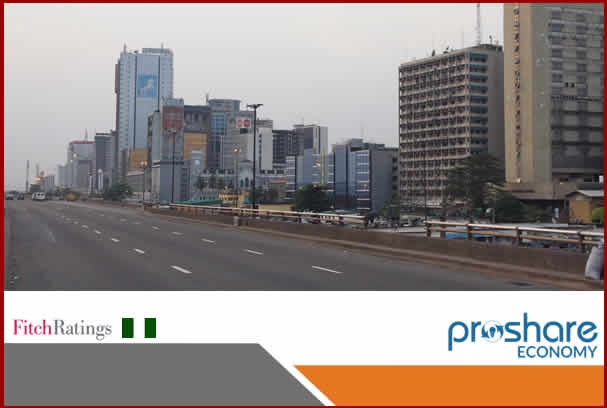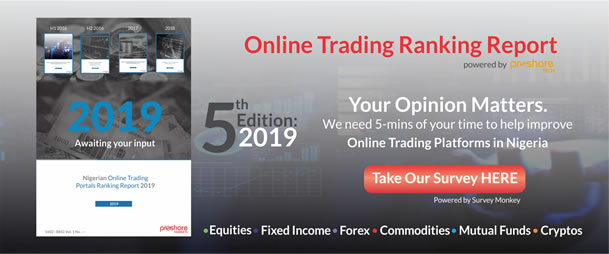Tuesday, June 11, 2019 / 03:47PM / Fitch Ratings /Header Image Credit: Wikipedia
Fitch Ratings has affirmed Lagos State's Long-TermForeign- and Local-Currency Issuer Default Ratings (IDRs) at 'B+' with StableOutlook and Short-Term Foreign-Currency IDR at 'B'. The National Long-TermRating has been affirmed at 'AA+(nga)', with a Stable Outlook. The ratings onLagos's medium-term note (MTN) programme and senior unsecured bonds have alsobeen affirmed at 'B+'/'AA+(nga)'.
Under Fitch's new criteria for LRGs, Lagos's IDR iscapped by the sovereign (B+/Stable). The ratings reflect the state's weak riskprofile by international standards against Fitch's expectations of sound debtsustainability driven by internally generated revenue (IGR), which underpinsLagos's capacity to serve its financial obligations. The ratings also reflectrising but sustainable adjusted debt. These assessments incorporatecounterparty risks and the sovereign rating. The Stable Outlook on the IDRsmirrors that on the sovereign.
Lagos is Nigeria's economic powerhouse with per capitaGDP above USD4.000, or double the national average, but is weak byinternational standards. Fuelled by public and private investment and apopulation over 20 million, Lagos's diverse economy is supportive of the widetax base that generates IGRs.
Key Rating Drivers
Revenue Robustness: Midrange
Lagos benefits from a diversified revenue structureled by IGR, which represented over 70% of its NGN560 billion operating revenueat end-2018. IGR is driven by moderately cyclical taxes such as PAYE (personalincome tax). The stable tax revenue is counterbalanced by the dynamicoil-related transfers from the central government (representing less than 10%of operating revenue) and some volatility of other operating revenue sourcessuch as sales proceeds, rents, land use charges, fees and fines.
Revenue Adjustability: Weaker
Given that Lagos has no tax-setting power on its mainIGR item, PAYE, Fitch believes that Lagos's fiscal flexibility relies on thewide but not fully exploited tax base of PAYE, as well as other potential revenuesources such as land use charges. In Fitch's view, additional revenue streamsshould cover the peak-to-trough revenue fall of -5.52% (NGN22 billion)experienced in 2015 by at least 50%. Lagos is a net contributor to Nigeria'sequalisation system enacted through the Federal Account Allocation Committee(FAAC).
Expenditure Sustainability: Midrange
Lagos's opex growth averaged 9.6% in 2010-2018, inline with operating revenue growth of 9.9%, allowing for a stable operatingmargin of around 50% on average. In its rating scenario, Fitch expectsoperating costs to increase by 9% or less than the country's double-digitinflation, factoring in a tighter grip on current expenditure and compliancewith expenditure targets, while coping with the expected 33% rise in staffcosts by 2020 due to the minimum wage increase set by the national government.
Expenditure Adjustability: Midrange
There are no mandatory balanced budget rules definedby the central government for states, which are required to keep their deficitsat 3% of national GDP. In its rating scenario of slow economic growth, Fitchexpects Lagos to continue to post large operating margins at 40%. Capex makesup 55% of Lagos's expenditure before debt service, keeping the share ofinflexible expenditure well below 70%. Fitch believes that the high level ofcapex is necessary to maintain the local attractiveness amid demographicpressures calling for more services on infrastructure, health and education.
Liabilities and LiquidityRobustness: Weaker
The national framework for debt is evolving and thusborrowing limits are quite wide. There are no restrictions concerning debtmaturities, interest rates or currency exposure. Lagos applies a prudentialrule of debt service not exceeding 30% of operating revenues and aims atreducing its currency exposure at 55% of its NGN850 billion outstanding debt atend-2018. To ensure timely debt service, its internal debt is assisted by astate-level irrevocable standing payment order while external debt is servedwith deductions from FAAC.
Liabilities and LiquidityFlexibility: Weaker
Lagos has consolidated access to financial marketswith repeated bond issuances, while domestic counterparties can provideliquidity lines and short-term credit. Counterparty risk on credit lines is inthe 'B' category, triggering a 'Weaker' assessment for this factor. Lagoscashes in a sinking fund to support its debt service on bonds and Fitchprudentially considers its year-end cash as earmarked to offset payables.
Debt Sustainability Assessment: 'aa'
In Fitch's rating scenario, Lagos's debtsustainability is assessed in the 'aa' category as reflected by a sound paybackratio (net adjusted debt to operating balance) at around three years in our2019-2023 rating case scenario. Fitch incorporates Lagos's weak fiscal debtburden of around 140%, which is high compared with the peer group, and debtservice coverage at around 2x.
Rating Derivation
Lagos's standalone credit profile (SCP) is assessed at'bb+', reflecting a combination of a weak risk profile and debt sustainabilityin the 'aa' category. The notch-specific rating positioning is assessed at thehigher end of the rating category to reflect the strong payback ratio belowfive. Fitch does not apply any asymmetric risk or extraordinary support fromthe central government. The SCP is capped at the sovereign level. The 'B'short-term rating is derived from Lagos's Long-Term IDR.
Key Assumptions
Fitch's key assumptions within our base and ratingcase for the issuer include:
- Operating revenue growing below nominal GDP growthrate around 15%;
- Operating expenditure growth at 11% in base case and9% in rating case (below inflation rate), with the exception of 2019 and 2020due to salary increases;
- Average cost of debt expected to remain around 10%on average;
- Capital expenditure is expected to be financed withoperating margins, minor capital grants and newdebt.
Rating Sensitivities
Any positive rating action on Nigeria will bereflected on Lagos's ratings, provided that Lagos maintains its strong debtsustainability metrics.
A downgrade of the sovereign's ratings would lead tocorresponding action on Lagos's IDR. A sustained deterioration of the paybackratio above five years in Fitch's rating case scenario, or a reassessment ofthe key risk factors due to unfavourable changes in the economy beyond Fitch'sexpectations, could also trigger a downgrade.
Related News
1. FitchAffirms Nigeria at 'B plus'; Outlook Stable
2. ICAN ReleasesInaugural Accountability Index Assessment Report
3. NFIU Bars DirectTransactions From State Joint Local Government Accounts
4. LagosState Has The Highest Debt Profile in 2018 - NBS
5. The Story Of AVisionless Caper: How Political Shenanigans Led To A Bond Default
6. No Impact onLagos Ratings from Missed Contracted Services Payments - Fitch
7. Global CreditRating (GCR) Downgrades Lagos State’s Environmental Municipality Note
8. Lagos State’sMunicipality Note Default: Understanding The Issues, Implications and Lessons
9. Lagos StateGovernment Defaults On Municipality Note Issue; Investors Fret Over Yields
10. Ambode Swears-inNew Head of Service, 6 Perm Secs; Charges Them to Inject Fresh Ideas
 Lagos, NG • GMT +1
Lagos, NG • GMT +1











 3960 views
3960 views








 Sponsored Ad
Sponsored Ad
 Advertise with Us
Advertise with Us









